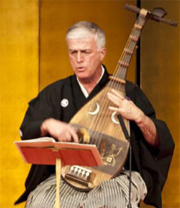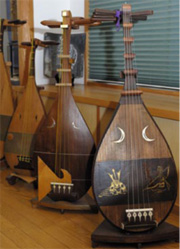Home > Highlighting JAPAN > Highlighting Japan FEBRUARY 2012 > A Lifelong Journey with the Biwa Lute
Highlighting JAPAN
MASTERS
A Lifelong Journey with the Biwa Lute
Swiss musician Dr. Silvain Guignard is a master of the traditional Japanese musical instrument called the biwa. He is the only foreign musician to have studied under Kyokusui Yamazaki, a Living National Treasure who died in 2006. Toshio Matsubara interviewed the biwa master.

Dr. Silvain Guignard performs at a concert in Tokyo in January, 2012.
Credit: MASATOSHI SAKAMOTO
Dr. Guignard explains, "What prompted me to start playing the biwa was my professor telling me, 'If you study the biwa and traditional Japanese music and culture, it will also deepen your expertise and understanding of Classical Western Music. So why not get some experience in Japan for four years or so?'" He continues, "I also fancied studying something other than Western music, but I came to Japan not really giving it that much thought. I never imagined I would end up staying in Japan and becoming a biwa player."
The biwa has a very long history and is alleged to have originated in Persia. It is said to have made its way into Japan via the Silk Road 1,400 years ago. It is a pear-shaped string instrument belonging to the lute family and has developed independently in Japan, evolving into several styles such as the Heike biwa, Satsuma biwa and Chikuzen biwa among others.
Dr. Guignard came to Japan in 1983 on a scholarship funded by the Japanese Ministry of Education, Science, and Culture. He began studying the biwa at Osaka University but, recommended by his professor to actually play the instrument rather than just study related material, he was then introduced to Kyokusui Yamazaki, a female biwa player regarded as one of the foremost experts of Chikuzen biwa music, who later became a Living National Treasure. For Dr. Guignard this was a truly life-changing encounter.
"My master was seventy-eight years old at the time and it was the first time she had ever had a foreign student, but she made me feel welcome. At first, it was hard because I didn't really understand Japanese but she was a truly wonderful person both in terms of her depth as an artist and her depth as a human being. I was simply captivated by my master and she taught me for an incredible twenty-two years, until just before she died at the age of 100. She helped me discover the wonder of the biwa. For me, this was an experience I truly treasure."

Dr. Guignard's biwa collection. The biwa at front carries images of a kabuto war helmet and a bow
Credit: YOSHIFUSA HASHIZUME
"The biwa is played very differently depending on its form and a master can only teach one form of biwa. The frets and shape of the plectrum are different, too, and there is also no interchange between performers of different forms. For example, the Satsuma biwa has the highest frets out of the various forms and you use strong finger pressure to express the fighting spirit of the samurai warrior. On the other hand, the frets of the Heike biwa are low and you just apply light pressure to the strings to express the sorrowful world of the kuge aristocracy. The Chikuzen biwa I was taught has high frets like the Satsuma biwa and, by applying pressure more quickly or more slowly, you can produce a very wide range of timbres to express a range of emotions like sadness, gladness or heroism."
Completely absorbed by the world of the biwa almost to the point of obsession, Dr. Guignard was one day told by Master Yamazaki in a biwa lesson:
"I have nothing more to tell you about the performing of this ballad. From now on, you must make it your own piece."
This was six years after he had begun studying under Master Yamazaki and her words acknowledged the fact that Dr. Guignard had at last begun to develop as a biwa artist in his own right. Dr. Guignard says that, from then, it took him many more years to reach the point where he could give a truly convincing performance.
"It took me twenty years to understand what it means to capture the moment, to bring the body and mind into perfect unity to express musical substance. Art is by no means easy. It is a very long, arduous journey."
Today, Dr. Guignard lives with his wife, Anne-Marie, in Otsu, Shiga Prefecture, overlooking Lake Biwa, Japan's largest lake. He says it is a relaxing place that reminds him of the lakes in Switzerland and that the silence essential for practicing the biwa is also precious. While teaching music and art as a professor in the Faculty of International Studies of Osaka Gakuin University, at the weekend, he has a packed schedule of performances playing the biwa. His performances, which seem to well from within, have won acclaim, and performance requests continue to roll in. In April, he plans to perform at a large concert in Zurich.
© 2009 Cabinet Office, Government of Japan






